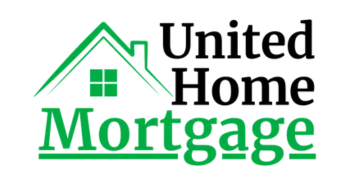Loan Options
With thousands of mortgage programs available, finding the right one can be daunting. Want to avoid overpaying? It’s simple—schedule a free mortgage consultation with United Home Mortgage Network, Colorado Springs' top-rated mortgage broker. Click the button below to get started on your homeownership journey with confidence and ease.


A Comprehensive Guide to the Home Buying Process for First-Time Homebuyers
"Owning a home is a keystone of wealth—both financial affluence and emotional security." — Suze Orman
Introduction
Buying your first home is an exciting milestone, but it can also be a daunting process filled with complex steps and decisions. At United Home Mortgage, we understand that the journey to homeownership can seem overwhelming, especially for first-time buyers. That’s why we’ve created this comprehensive guide to help you navigate the home buying process with confidence. From understanding your financial readiness to exploring first-time homebuyer programs and closing on your dream home, this guide will walk you through each step of the journey.
Understanding Your Financial Readiness
Before you begin searching for your dream home, it's essential to assess your financial readiness. Understanding your financial situation will help you determine how much home you can afford and set realistic expectations.
1. Assessing Your Income and Expenses
Start by evaluating your income and monthly expenses. This includes your salary, any additional income sources, and your regular monthly obligations such as rent, utilities, groceries, and transportation. Understanding your cash flow will give you a clearer picture of how much you can allocate toward a mortgage payment.
2. Checking Your Credit Score
Your credit score plays a significant role in your ability to secure a mortgage and the interest rate you'll be offered. A higher credit score can lead to better loan terms, while a lower score may limit your options. It's important to check your credit report and address any inaccuracies or issues before applying for a mortgage.
3. Saving for a Down Payment
One of the most critical aspects of buying a home is saving for a down payment. While some mortgage programs require as little as 3% down, a larger down payment can help you secure a better interest rate and reduce your monthly payments. Consider setting up a dedicated savings account for your down payment and contribute to it regularly.
4. Understanding Debt-to-Income Ratio (DTI)
Lenders use your debt-to-income ratio (DTI) to assess your ability to manage monthly payments and repay your mortgage. Your DTI is calculated by dividing your total monthly debt payments by your gross monthly income. A lower DTI ratio indicates a stronger financial position and can improve your chances of mortgage approval.
5. Creating a Budget for Homeownership
Homeownership comes with additional costs beyond the mortgage payment, including property taxes, homeowners insurance, maintenance, and utilities. Create a budget that accounts for these expenses to ensure you're financially prepared for the responsibilities of owning a home.
Exploring First-Time Homebuyer Programs
As a first-time homebuyer, you may be eligible for various programs that offer financial assistance, lower interest rates, and more favorable loan terms. These programs are designed to make homeownership more accessible and affordable.
1. FHA Loans
The Federal Housing Administration (FHA) offers loans with lower down payment requirements and more lenient credit score criteria. FHA loans are an excellent option for first-time buyers who may not have a large down payment or a high credit score.
2. VA Loans
If you're a veteran, active-duty service member, or eligible surviving spouse, you may qualify for a VA loan. VA loans offer no down payment, no private mortgage insurance (PMI), and competitive interest rates, making them one of the best options for eligible borrowers.
3. USDA Loans
The United States Department of Agriculture (USDA) offers loans for homebuyers in eligible rural and suburban areas. USDA loans often require no down payment and provide low-interest rates, making them an attractive option for those purchasing in designated areas.
4. State and Local Programs
In addition to federal programs, many states and local governments offer first-time homebuyer programs that provide down payment and closing cost assistance. For example, the Colorado Housing and Finance Authority (CHFA) offers several programs that can help reduce the financial burden of buying a home.
CHFA Down Payment Assistance Grant: Offers up to 4% of your first mortgage as a grant that does not have to be repaid.
CHFA Second Mortgage Loan: Provides a second mortgage loan to cover your down payment and closing costs, which is repaid alongside your primary mortgage.
5. Nonprofit and Community-Based Programs
Organizations like the Colorado Housing Assistance Corporation (CHAC) provide additional resources for first-time homebuyers, including counseling, down payment assistance, and education programs. These organizations can be a valuable resource for understanding your options and preparing for homeownership.
Pre-Approval: Your First Step Towards Homeownership
Once you've assessed your financial readiness and explored available programs, the next step is to get pre-approved for a mortgage. Pre-approval is a crucial step that demonstrates to sellers that you are a serious buyer and gives you a clear understanding of your purchasing power.
1. What is Mortgage Pre-Approval?
Mortgage pre-approval is a process where a lender evaluates your financial information, including your income, assets, debts, and credit history, to determine how much they are willing to lend you. The lender will issue a pre-approval letter stating the loan amount you qualify for, which you can present to sellers when making an offer.
2. How to Get Pre-Approved
To get pre-approved, you'll need to provide the lender with documentation such as pay stubs, tax returns, bank statements, and proof of assets. The lender will also pull your credit report to assess your creditworthiness. Once your information is reviewed, the lender will provide you with a pre-approval letter.
3. The Benefits of Pre-Approval
Getting pre-approved offers several advantages:
Increased Buying Power: Knowing your budget allows you to shop confidently for homes within your price range.
Faster Closing Process: With pre-approval in hand, the mortgage approval process will be quicker once you find a home.
Stronger Negotiation Position: Sellers are more likely to accept offers from pre-approved buyers, as it indicates you are financially prepared to close the deal.
House Hunting: Finding Your Dream Home
With your pre-approval in hand, you're ready to start the exciting process of house hunting. This step involves searching for homes that meet your criteria and working with a real estate agent to find the perfect property.
1. Defining Your Homebuying Criteria
Before you begin your search, take some time to define what you're looking for in a home. Consider factors such as:
Location: Proximity to work, schools, and amenities.
Size: Number of bedrooms, bathrooms, and overall square footage.
Type of Home: Single-family, townhouse, condo, etc.
Features: Must-have features like a garage, backyard, or updated kitchen.
2. Working with a Real Estate Agent
A knowledgeable real estate agent can be an invaluable asset during the house hunting process. They can help you find homes that meet your criteria, schedule showings, and provide insights into the local market. Your agent will also guide you through making an offer and negotiating with the seller.
3. Attending Open Houses and Showings
Attending open houses and private showings gives you the opportunity to explore potential homes and get a feel for different neighborhoods. Take notes and pictures during each visit, so you can compare properties later.
4. Evaluating Potential Homes
As you tour homes, consider how each property aligns with your needs and preferences. Pay attention to the home's condition, layout, and any potential maintenance issues. It's also important to consider the surrounding neighborhood and its potential for future growth.
Making an Offer and Negotiations
Once you've found the perfect home, it's time to make an offer. This step involves determining the right price to offer, negotiating with the seller, and finalizing the purchase agreement.
1. Determining Your Offer Price
Your real estate agent can help you determine a competitive offer price based on the home's market value, comparable sales in the area, and your budget. It's essential to make an offer that reflects the home's worth while considering your financial situation.
2. Submitting the Offer
Your real estate agent will prepare a written offer that includes the purchase price, any contingencies (such as a home inspection), and the proposed closing date. The offer is then submitted to the seller's agent for review.
3. Negotiating with the Seller
In many cases, the seller may counter your offer with a different price or terms. Negotiations can involve going back and forth on various aspects of the deal, including the purchase price, closing costs, and contingencies. Your agent will work with you to navigate these negotiations and reach an agreement that satisfies both parties.
4. Finalizing the Purchase Agreement
Once you and the seller agree on the terms, you'll sign a purchase agreement that outlines the details of the sale. This legally binding contract will include the final purchase price, closing date, and any contingencies that must be met before closing.
The Home Inspection and Appraisal
After your offer is accepted, two critical steps take place: the home inspection and the appraisal. These steps ensure that the home is in good condition and that the purchase price aligns with its market value.
1. The Home Inspection
A home inspection is a thorough evaluation of the property's condition conducted by a licensed inspector. The inspector will examine the home's structure, systems (electrical, plumbing, HVAC), and other components to identify any potential issues. After the inspection, you'll receive a detailed report outlining any problems or needed repairs.
Addressing Inspection Issues: If the inspection reveals significant issues, you may negotiate with the seller to make repairs or reduce the purchase price. In some cases, you may also choose to walk away from the deal if the issues are too severe.
2. The Appraisal
An appraisal is an independent assessment of the home's market value, conducted by a licensed appraiser. The appraisal ensures that the property's value supports the loan amount you've applied for. If the appraisal comes in lower than the purchase price, you may need to renegotiate with the seller or come up with the difference in cash.
###The Home Appraisal: Ensuring Your Home’s Value
An appraisal is an essential part of the home buying process, especially for first-time homebuyers. This independent assessment is conducted by a licensed appraiser who determines the market value of the property you wish to purchase. The appraisal is primarily for the lender’s benefit, ensuring that the home is worth the loan amount requested.
Understanding the Appraisal Process: The appraiser evaluates the property based on various factors, including its location, condition, and comparable home sales in the area. This helps the lender confirm that they are not lending more than the home is worth.
What if the Appraisal is Low?: In cases where the appraisal value is lower than the purchase price, you have a few options. You could negotiate with the seller to lower the price, bring more cash to the table to cover the difference, or dispute the appraisal if you believe there’s been an error. Your mortgage professional can guide you through these steps.
Finalizing Your Mortgage
With the home inspection and appraisal behind you, it's time to finalize your mortgage. This stage involves locking in your interest rate, completing all necessary documentation, and ensuring all conditions of the purchase agreement are met.
1. Locking in Your Interest Rate
Interest rates can fluctuate, so it's essential to lock in your rate once you're confident in your mortgage terms. Your lender will offer you a rate lock, which guarantees your interest rate for a specified period, typically 30 to 60 days. Locking in your rate protects you from any market changes that could increase your mortgage costs.
2. Reviewing and Signing the Loan Estimate
Your lender will provide a Loan Estimate, a document outlining the key terms of your mortgage, including the interest rate, monthly payments, and closing costs. Review this document carefully to ensure it aligns with your expectations. If everything looks good, you'll sign the Loan Estimate to move forward with the mortgage process.
3. Meeting Loan Conditions
Your lender may have set specific conditions that must be met before final approval, such as providing additional documentation or paying off outstanding debts. It's crucial to address these conditions promptly to avoid delays in your closing date.
Closing the Deal
Closing is the final step in the home buying process, where ownership of the property is officially transferred from the seller to you. This stage involves signing the final paperwork, paying any remaining fees, and receiving the keys to your new home.
1. What to Expect at Closing
On closing day, you'll meet with your real estate agent, lender, and possibly an attorney to sign the final documents. These documents include the Closing Disclosure, which details your loan terms and closing costs, as well as the mortgage note and deed of trust. You'll also pay your down payment and closing costs, which can be done via wire transfer or certified check.
2. The Closing Disclosure
The Closing Disclosure is one of the most critical documents you'll review at closing. It provides a final breakdown of your loan terms, including the loan amount, interest rate, monthly payments, and closing costs. Compare the Closing Disclosure to your Loan Estimate to ensure there are no significant discrepancies.
3. Final Walk-Through
Before closing, you'll have the opportunity to do a final walk-through of the property. This walk-through allows you to ensure that the home is in the agreed-upon condition and that any repairs negotiated after the inspection have been completed.
4. Receiving the Keys
Once all the documents are signed and the funds have been transferred, you'll receive the keys to your new home. Congratulations, you're now a homeowner!
Post-Purchase Considerations
Now that you've successfully purchased your first home, there are a few post-purchase considerations to keep in mind to ensure your transition to homeownership is smooth and stress-free.
1. Setting Up Utilities and Services
One of the first things you'll need to do is set up utilities and services for your new home. This includes electricity, water, gas, internet, and trash collection. Contact the service providers in your area to establish accounts and schedule any necessary installations.
2. Homeowners Insurance
While you likely obtained homeowners insurance as a requirement for your mortgage, it's essential to review your policy to ensure it provides adequate coverage for your home and belongings. Consider adding additional coverage for natural disasters or other risks specific to your area.
3. Maintenance and Repairs
Regular home maintenance is crucial to preserving your property's value and avoiding costly repairs. Create a maintenance schedule that includes tasks such as changing HVAC filters, cleaning gutters, and inspecting your roof for damage.
4. Budgeting for Homeownership
Homeownership comes with ongoing expenses, including property taxes, insurance, and maintenance costs. Review your budget to account for these expenses and consider setting aside an emergency fund for unexpected repairs or financial challenges.
5. Building Equity
As you make mortgage payments, you'll gradually build equity in your home. Building equity is an essential part of homeownership, as it increases your net worth and provides you with financial options, such as refinancing or taking out a home equity loan.
6. Refinancing Options
Over time, you may have the opportunity to refinance your mortgage to take advantage of lower interest rates or to access your home's equity for major expenses. Keep an eye on market trends and consult with your mortgage professional to determine if refinancing is right for you.
Schedule Your One-on-One Mortgage Consultation
Buying a home is a significant financial commitment, and having a trusted mortgage professional by your side can make all the difference. At United Home Mortgage, we're dedicated to helping first-time homebuyers navigate the mortgage process with confidence. Our team of experienced mortgage brokers will work with you to find the best loan options for your unique situation.
Whether you're just starting your home buying journey or ready to move forward with a mortgage, we're here to help. Schedule your one-on-one mortgage consultation today to learn more about how we can assist you in achieving your homeownership goals.
United Home Mortgage Network Inc TM DBA United Home Mortgage TM NMLS 1984776 @ Copyright 2024 - All Rights Reserved







